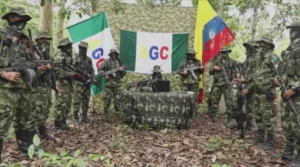Colombia’s President Gustavo Petro has made a striking proposal to the Gulf Clan, urging this notorious drug cartel to negotiate.
In Antioquia’s Apartadó, he suggested a shift from illegal operations towards regional prosperity, allowing the gang to enter the region’s establishment.
This marks a pivotal step towards peace, inviting a group linked to paramilitarism into dialogue.
The Gulf Clan responded positively, showing a preference for political dialogue over surrender.
This interaction reveals the government’s effort to include various illegal factions in its peace initiative.
Previously, Petro had indicated the possibility of military action against the Clan, known for a significant share of the country’s drug trade and various crimes.

In February, the clan decried a governmental extermination policy. Integrating the Gulf Clan into peace talks is essential, as Petro believes it’s key to quelling violence across Colombia.
Think tanks have underscored the importance of dialogue with this group, which has grown from fewer than 4,000 to over 6,000 members recently.
Negotiating with this large armed force demands a balanced legal framework, as per the Ideas for Peace Foundation (FIP).
It must offer incentives for leaving crime behind while maintaining justice and public support.
The International Crisis Group(ICG) warns that excluding the Clan from peace talks could jeopardize negotiations with other groups.
The ICG stresses the complexity of disbanding the clan, necessitating new laws and incentives to ensure ex-combatants can transition away from crime.
This requires maintaining police and military pressure on the clan and encouraging them towards negotiation.
Analyst Jorge Mantilla points out that negotiations will largely involve the Prosecutor’s Office, focusing on judicial rather than political agreements.
These talks aim to provide judicial and economic benefits, along with security guarantees. Transforming territories and integrating the clan socially are also critical.
With peace talks with the Central General Staff facing hurdles, Petro’s government remains committed to resuming dialogue in April.
This concerted effort toward negotiation underscores the challenging yet crucial path to achieving peace in Colombia.

